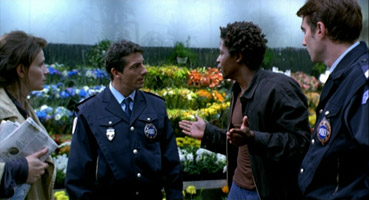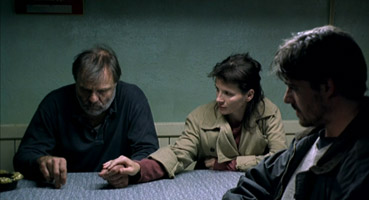|
Code Unknown is one of Austrian filmmaker Michael Haneke's most structurally complex and multi-layered films. It tells a number of seemingly disconnected stories in linear but fragmented fashion, a series of vignettes from very different lives, each captured in a single take in which the camera stays locked on one person (with occasional switches to a second when necessary), sequences that are often topped and tailed of their establishing and closing moments. They are, as the secondary title indicates, incomplete tales of several journeys, but journeys rich in observational detail and social commentary.
What starts almost as a deconstruction of chaos theory's butterfly effect – a food wrapper thoughtlessly discarded by one person ultimately results in the deportation of another – develops into an exploration of the changing nature of modern European society, and specifically the consequences of our increasing inability, or perhaps unwillingness, to effectively communicate. Separated by ethnicity and social status, the lives of the disparate characters are nonetheless shown to be interconnected though a combination of chance and attitude, lives affected by the views, prejudices and social position of others.

The links are established at an early stage. Young Jean (Alexandre Hamidi) has run away from his father's farm and come to Paris in search of brother Georges (Thierry Neuvic), a successful photographer who lives with his actress girlfriend Anne (Juliette Binoche). When he tosses his food wrapper into the lap of Romanian beggar Maria (Luminita Gheorghiu), he is directly confronted by Amadou (Ona Lu Yenke), a young black man with a strong sense of justice who demands that he apologise. His angry refusal develops into a physical struggle that attracts the attention of the police, who too easily accept Jean's version of events and take Amadou and Maria into custody. The racism is insidiously subtle, a spot judgement made unanimously on skin colour and ethnic origin, with Jean's claim that he was assaulted by Amadou eliciting the one-word response "typical" from a well-to-do bystander.
As the individual stories unfold, a number of similarities between them emerge. A sprinkling of keywords are provided in the opening scene, in which young deaf students attempt to decipher the meaning of a mime performed by one of their classmates – 'alone', 'hiding place', 'bad conscience', 'sad' – and all prove to be directly relevant to the differing lives of the protagonists. Particularly pertinent is the final word, 'imprisoned', which finds representation both literal – as with Georges' story of being held captive by the Taliban, or the scene Anne is required to perform for her audition – and figurative, as in the manner in which lives are constrained by attitudes and beliefs, both of individual choice and those imposed by others. The further down the social ladder you sit, the more likely you are to be victim of the latter.
There is a cyclic element to the stories in which lessons are taught but not really learned. Maria's forced return to Romania re-unites her with her family, but it's only a matter of time before she's being smuggled back to Paris and returns to the boulevard on which she was arrested, where her begging spot has been taken by another unfortunate in similar economic dire straights. Anne, meanwhile, experiences what it's like to be targeted for her looks and ethnicity when she is harassed and ultimately spat on by an Arabic boy on a Metro train, the refusal of the other passengers to get involved (and how true this scene is) a reflection of her decision to do likewise with the young daughter of a neighbour, whose cries she overheard but whose later death she did nothing to prevent. The cycle is completed through a second literal realisation of the title, with Georges unable to gain entry to Anne's apartment because the door entry code has been changed, a fate that also befell Jean at the film's start, where his hour-long wait for Anne led to the frustration that triggered the subsequent events.

It's the almost offhand layering of the detail that makes Code Unknown both challenging and immensely rewarding, a second or third viewing clarifying information that can easily slip by on the first (a name mentioned in a supportive context in one story, for example, has already cropped up as that of a potential bully in another). The economy of Haneke's storytelling masks the complexity of the execution, the sequence-long takes requiring a sometimes extraordinary marshalling of background action (the post-title boulevard sequence is a small miracle of organisation and timing and is rightly highlighted in the DVD extras), a technique he employed to introduce a degree of temporal truth into a medium that he believes is incapable of fully capturing realty. But capture reality he does, or at least to the degree that a filmmaker can, and shapes it in a way that requires thoughtful deconstruction and a rethink of our own attitudes and the possible consequences of our words and actions on others.
The anamorphic 1.85:1 transfer here is a couple of notches shy of ideal. The contrast is sound enough but there is slight softness to the picture that is more evident in wide shots – you'd be pushed to realise it was Anne in the stage audition, as shot from the back of the theatre and spot-lit she is lacking any distinguishing detail. Medium shots and close-ups fare better, and detail there is often rather good.
The Dolby 2.0 stereo soundtrack is clear with some specific separation of sound effects. There is no traditional music score, but the African drumming performed by the deaf students, which carries over onto the final scenes to give them an unexpected sense of climax, has a pleasing punch.
Trailer (2:55)
Actually there are two trailers here, both consisting of a single long take, followed by one of the deaf school mime guesses. I've a feeling there may have been a whole series of these at the time of the film's release.
Making-of documentary (27:25)
A compilation of behind-the-scenes footage driven by interviews with Haneke and a sprinkling of his collaborators. Particularly fascinating is the coverage of the filming of the first boulevard sequence, which includes a nearly disastrous accident when actor Ona Lu Yenke accidentally hits Alexandre Hamidi hard enough to knock him cold. Also covered are Maria's return to Romania and the Metro sequence. You are left with a clear sense of just how hard and complicated filmmaking can be.
Introduction by director Michael Haneke (4:27)
Haneke gives an interesting though not too specific overview of the film's genesis and purpose.
Filming the Boulevard Sequences (11:29)
A most welcome piece in which Heneke provides a detailed explanation of the complicated logistics of filming the boulevard sequences, complete with a hand-drawn map of the area and extracts from both sequences on the editing bench.
There are also Filmographies for Juliette Binoche and Michael Haneke, and a textual Director's Statement, which actually asks more questions than it answers.
I've only touched on the intricacies and detail of Code Unknown here, and it's probably the only way to introduce it without getting into overly complex analysis of the sort that's best done after you and those you're talking to have all seen the film. The transfer is a notch below what it could be, but not enough to get dismissive about, and the extra features are nicely targeted.
|